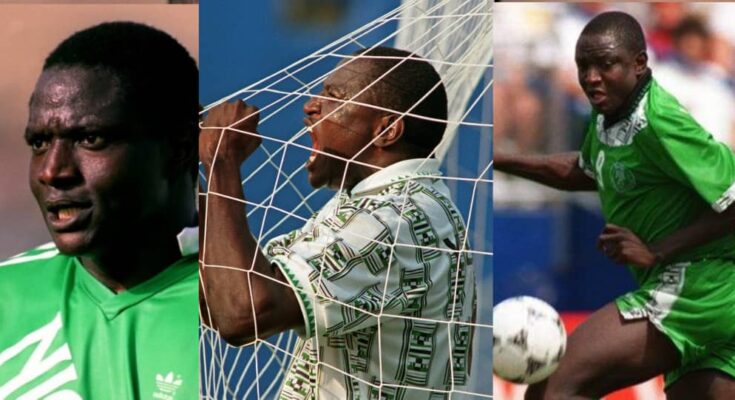By Oluwagbeminiyi
In the history of Nigerian football, one name shines brighter than most: Rashidi Yekini. His journey from a small village to international stardom is a story that inspires and captivates the hearts of many.
He was not just a football player; he was a legend, an icon, and a symbol of hope for the nation. This article delves into the life and career of Rashidi Yekini, unravelling the untold journey of this Nigerian football legend.
READ ALSO: Rashidi Yekini at 60: Google pays tribute to Nigeria’s football legend
Early Life and Background
Rashidi Yekini was born on October 23, 1963, in Kaduna, Nigeria. He grew up in a modest household, the son of Alhaji Yekini, a devout Muslim, and Alhaja Sikirat Yekini. Football was in his blood, as his father had been a football enthusiast in his youth. This passion for the sport would eventually be passed down to Rashidi.
Yekini’s early years were marked by his innate talent and passion for football. He often played with friends on dusty streets and makeshift pitches. His sheer enthusiasm and determination were evident even at a young age. These qualities and his talent would set him on a path to greatness.
Rise to Stardom
Rashidi Yekini’s journey in professional football began with the UNTL Kaduna football club in 1981. Here, he started to make a name for himself as a prolific goalscorer. His speed, strength, and ability to find the back of the net quickly drew the attention of scouts from top Nigerian clubs. Yekini’s reputation as a goal machine led to a transfer to Shooting Stars FC (3SC), a prominent club in Nigerian football, in 1984.
3SC provided the platform for Yekini to showcase his incredible goal-scoring abilities. He became an integral part of the team and helped them secure the Nigerian Premier League title in 1984 and 1986. His outstanding performances earned him a call-up to the Nigerian national team, the Super Eagles, in 1984.
International Success
Rashidi Yekini debuted for the Nigerian national team in 1984 in a match against Cote d’Ivoire. He made an instant impact, scoring a goal that showcased his incredible talent. Yekini’s journey with the Super Eagles was a rollercoaster ride filled with moments of triumph and despair.
One of the defining moments of Yekini’s international career came during the 1990 FIFA World Cup held in Italy. Nigeria debuted in the tournament, and Yekini played a major role.
He scored Nigeria’s first-ever World Cup goal in a match against Bulgaria, etching his name in the history books. The image of Yekini celebrating the goal, clutching the net in sheer jubilation, remains an iconic moment in Nigerian football history.
Yekini continued to shine in the tournament, finishing as the competition’s top scorer with five goals.
He played a crucial role in Nigeria’s journey to the round of 16, where Italy eventually eliminated them. Despite the heartbreaking loss, Yekini’s performance in the tournament earned him widespread praise.
Club Career
After his amazing performance at the World Cup, Yekini’s popularity grew in the football world. In 1990, he made a big move to Europe and joined a club in Portugal called Vitória de Setúbal. He quickly adapted to European football, became an important player for the club, and showed off his talent for scoring goals. While in Portugal, he scored an impressive 34 goals in 32 league matches.
Yekini’s success in Portugal caught the attention of even bigger European clubs, leading to a transfer to Olympiacos FC in Greece. Despite facing challenges in Greece, he made a significant impact and left a memorable mark.
Later, he played for other European clubs, including Sporting Gijón in Spain and FC Zürich in Switzerland. His time in Europe allowed him to experience different football cultures and improve his skills. However, it wasn’t easy for him because he had to leave home and adapt to new places.
In 1994, Yekini returned to Nigeria and joined the Nigerian club Abiola Babes. His return was welcomed by fans and marked the beginning of a new chapter in his career. Despite playing in the Nigerian domestic league, Yekini continued to score goals at an impressive rate.
Challenges and Personal Struggles
Rashidi Yekini had a successful football career but had some personal problems. He was known for his intense and unusual behaviour on the field, which sometimes carried over into his personal life. He also had some emotional and mental difficulties, and life after football was hard for him.
When he retired from football in 2003, it was a big change for Nigerian football. People were worried because Yekini wasn’t in the spotlight anymore. There were rumours that he didn’t have enough money and had mental health problems.
Legacy and Impact
Rashidi Yekini’s impact on Nigerian football and the sport as a whole is immeasurable. He remains Nigeria’s all-time top scorer, with 37 goals in 58 international appearances. Yekini’s goal-scoring record is a testament to his talent and dedication to the game. He is also remembered for his unique goal celebration, which has become an iconic image in the world of football.
Yekini’s legacy extends beyond the football pitch. He inspired a generation of Nigerian footballers to dream big and work hard to achieve their goals. His success in Europe opened doors for other Nigerian players, paving the way for future generations to make a mark on the global stage.
Death
Rashidi Yekini died on May 4, 2012, when he was 48 years old. His death made a lot of people who love football sad, and Nigeria was very upset, too. He was a hero for the country, and everyone felt very sad about his passing. Many people from Nigeria and other places said nice things about him.
Yekini’s contributions to Nigerian football did not go unnoticed. In honour of his legacy, the Nigerian Football Federation (NFF) and the Nigerian government took steps to commemorate his name. The NFF established the Rashidi Yekini Foundation, which works to preserve his memory and support initiatives in line with his values.
Conclusion
The untold journey of Rashidi Yekini is a story of talent, dedication, and passion for the beautiful game of football. He defied the odds to become a Nigerian football legend, leaving an indelible mark on the sport at home and abroad.








